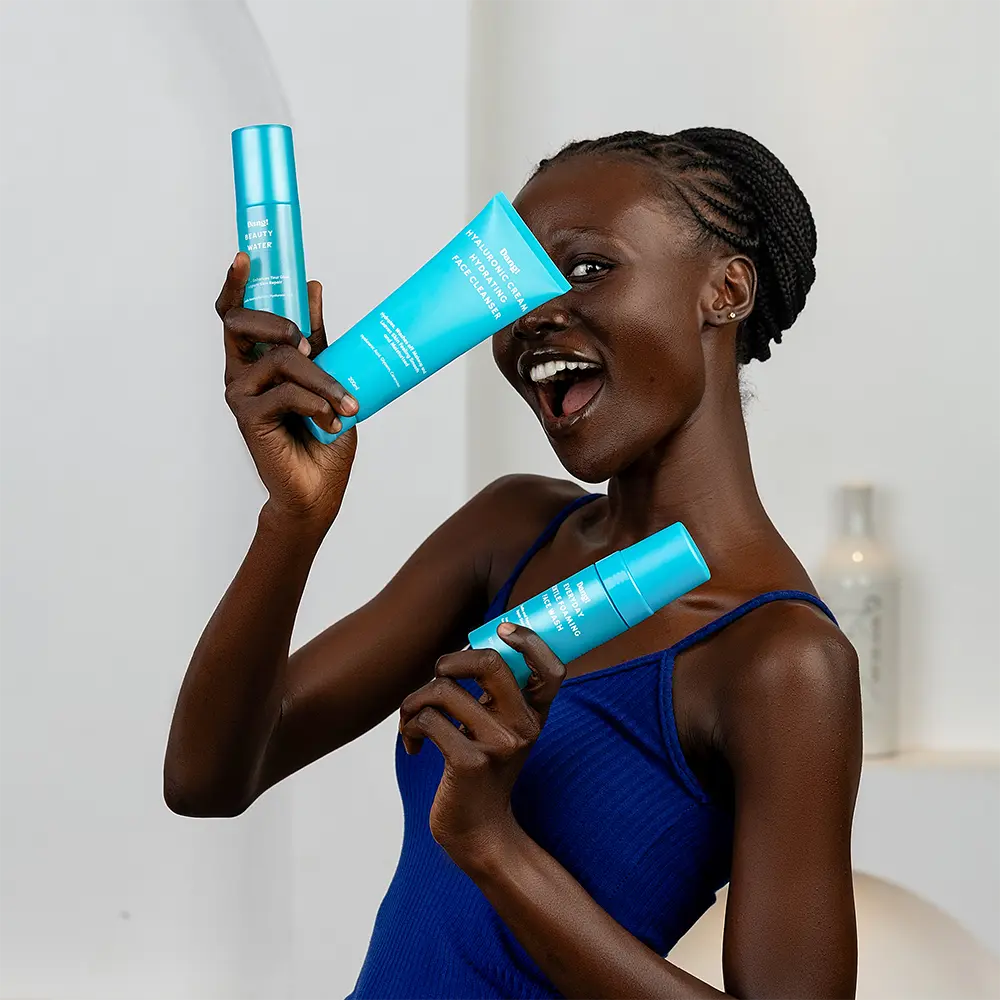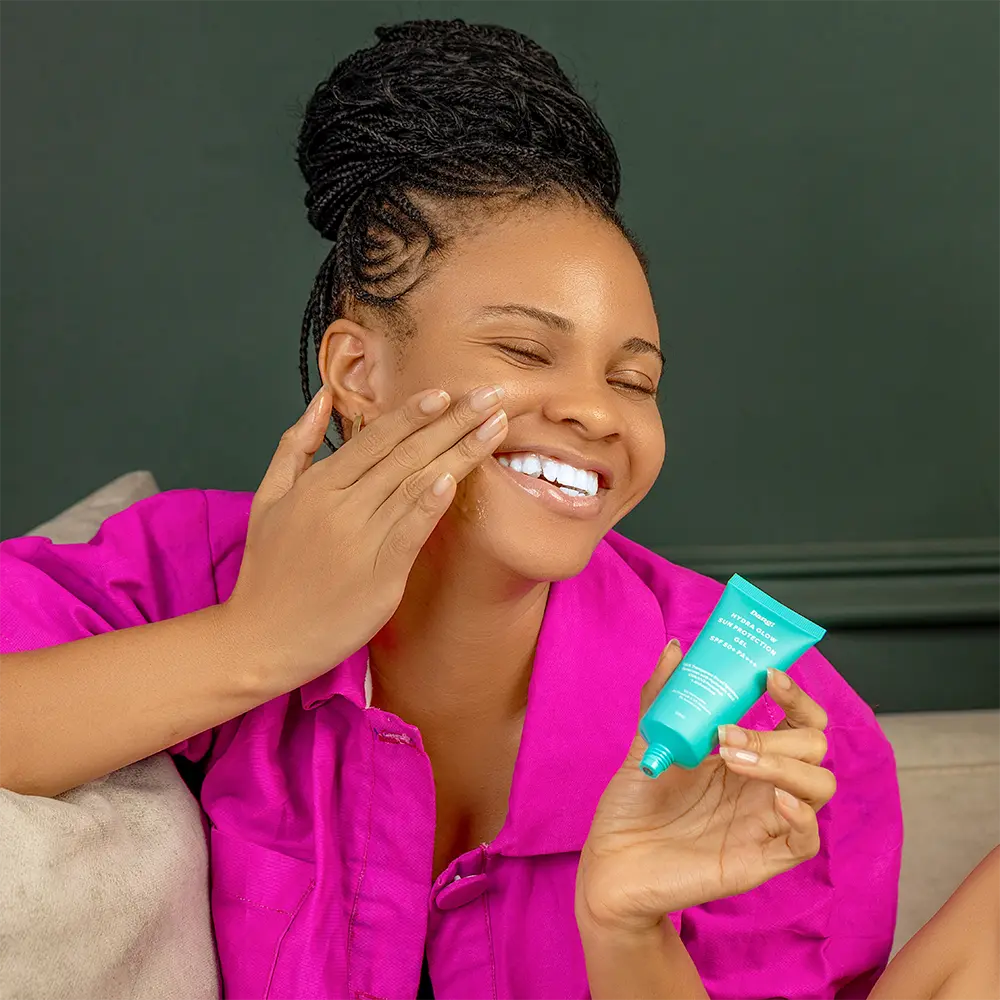
Spend ₦300K+, Get 20% Off Spa Treatments!
All prices shown include the discount
Up to 40% Off Sitewide. June 30th - July 7th.
Up to 40% Off Sitewide. June 30th - July 7th.
Up to 40% Off Sitewide. June 30th - July 7th.

Skeptical about using hyaluronic acid because you’re scared it may darken your skin? In this post, our in-house experts share more insight into this.
In the skincare world, there are so many misconceptions caused by misinformation or personal experiences. But with the right information, you can make more informed decisions and get the best results from your skincare products.
So, let’s get right in!
Hyaluronic acid does not make skin dark. Hyaluronic acid is clear and colourless and by itself doesn’t contain any properties that could potentially darken the skin.
It works primarily as a humectant, drawing moisture into the skin. This hydration can improve overall skin health and appearance, potentially leading to a more even skin tone.
Hyaluronic acid (HA) is a naturally occurring glycosaminoglycan, a type of sugar molecule predominantly found in skin tissues. It plays a crucial role in keeping the skin moisturized, firm, and wrinkle-free.
Over time, factors such as prolonged UV exposure, ageing, and biological changes can lead to a decrease in the natural levels of hyaluronic acid in the skin. Therefore, replenishing this vital substance is essential for maintaining overall skin health.
There are various ways to replenish hyaluronic acid, as it exists in different forms. Topical hyaluronic acid is commonly found in serums, creams, and lotions that you apply directly to the skin.
Oral supplements are available in capsule or tablet form, designed to support skin hydration from within. Injectable hyaluronic acid is primarily used in cosmetic procedures to add volume and reduce wrinkles.
Each form has its unique benefits and applications. Choose the best option for your skincare needs. However, we highly recommend using the topical form (skincare products) as topical hyaluronic acid has been proven to be very beneficial for the skin.

Using HA in your skincare routine can bring a world of benefits to your overall skin health. Some of the most impressive benefits to expect include;
In summary, incorporating hyaluronic acid into your skincare regimen can improve your skin’s overall appearance and make it a versatile ingredient suitable for all skin types.
No, hyaluronic acid does not make skin dark. Hyaluronic acid is clear and colourless and by itself doesn’t contain any properties that could potentially darken the skin.
It works primarily as a humectant, drawing moisture into the skin. This hydration can improve overall skin health and appearance, potentially leading to a more even skin tone.
However, there are some rare instances and factors that may contribute to skin darkening or hyperpigmentation when using HA products.
They include;
Some individuals may experience irritation or allergic reactions to HA formulations, particularly if they contain additional active ingredients. This irritation can lead to post-inflammatory hyperpigmentation (PIH), especially in darker skin types. Inflammation triggers an increase in melanin production, which can result in dark spots or patches on the skin
Using HA without adequate sun protection can lead to increased pigmentation. While HA does not cause darkening, it is essential to use sunscreen when incorporating any new skincare product, as UV exposure can worsen pigmentation issues.
Applying HA on dry skin instead of damp skin may lead to moisture being drawn from deeper layers of the skin, potentially causing dryness and irritation. This can create a dull appearance that might be perceived as darkening, particularly if the skin becomes flaky or uneven.
When used alongside other potent actives (like retinoids or alpha hydroxy acids), HA may enhance penetration but could also increase the risk of irritation, leading to PIH in sensitive individuals. It is crucial to monitor how your skin reacts when combining these ingredients
Summarily, hyaluronic acid does not directly cause skin darkening, various factors can contribute to changes in skin pigmentation. However, proper application techniques and sun protection can help minimize these risks.
No, hyaluronic acid does not directly lighten the skin. HA is primarily known for its hydrating and anti-ageing properties, effectively minimizing the appearance of wrinkles and improving skin texture.
However, it does not possess inherent skin-brightening properties. Also, there is currently limited clinical evidence directly linking HA to skin lightening.
While HA does not directly lighten the skin or reduce pigmentation, it can contribute to a brighter complexion indirectly. By providing essential hydration, HA strengthens the skin barrier and enhances the overall appearance of the skin.
Additionally, HA promotes cell turnover and nourishes the skin, which may help reduce hyperpigmentation over time. For optimal results in treating dark spots or achieving a brighter complexion, HA is often recommended to be used alongside other ingredients like vitamin C, known for its brightening effects.
Therefore, incorporating hyaluronic acid into your skincare routine can lead to healthier, more vibrant skin while protecting against environmental stressors that may contribute to dark spots.

Here’s a simple routine and product recommendations to maximize the benefits of this versatile ingredient.
Repeat the same process for your night routine except for the sunscreen.
By following these steps, you can establish an effective routine and maximize the impressive benefits of hyaluronic acid.
Hyaluronic acid is a powerful ingredient that plays a vital role in maintaining skin health and appearance. It serves as a humectant, drawing moisture into the skin and enhancing hydration.
This increased moisture can lead to a more radiant and even complexion, as well as improved elasticity and reduced fine lines. While HA itself does not lighten or darken the skin, its ability to support overall skin health can help combat environmental stressors that contribute to pigmentation issues.
By incorporating hyaluronic acid into your skincare routine, alongside proper sun protection and complementary brightening ingredients, you can achieve healthier, more vibrant skin.
While hyaluronic acid itself does not cause post-inflammatory hyperpigmentation (PIH), some users may experience irritation or allergic reactions to HA formulations, especially if they contain additional active ingredients.
This irritation can lead to inflammation, which may trigger increased melanin production and result in dark spots, particularly in those with darker skin types.
Yes, hyaluronic acid is considered safe to use in sunny conditions. It does not increase sun sensitivity and can help maintain skin hydration. However, it is crucial to apply sunscreen when using HA products outdoors.
To avoid adverse effects when using hyaluronic acid, apply it on damp skin rather than dry skin. This maximizes its hydrating properties by allowing HA to draw moisture from the environment into the skin.
Follow up with a moisturizer to lock in hydration and prevent any potential dryness or irritation.
Hyaluronic acid generally interacts well with other skincare ingredients and is safe to combine with many actives, including niacinamide and retinol. However, when used alongside potent actives like retinoids or alpha hydroxy acids (AHAs), there may be an increased risk of irritation for some individuals.
It’s important to monitor your skin’s reaction and adjust usage accordingly.
In stock
$24.00 Original price was: $24.00.$22.40Current price is: $22.40.
In stock
$38.00 Original price was: $38.00.$35.50Current price is: $35.50.

DANG! LIFESTYLE
Connect with us
Exclusive offers, a heads up on new things, and sightings of Dang! #DangLifestyle
Customer Support
+2349073332942
Copyright © 2025